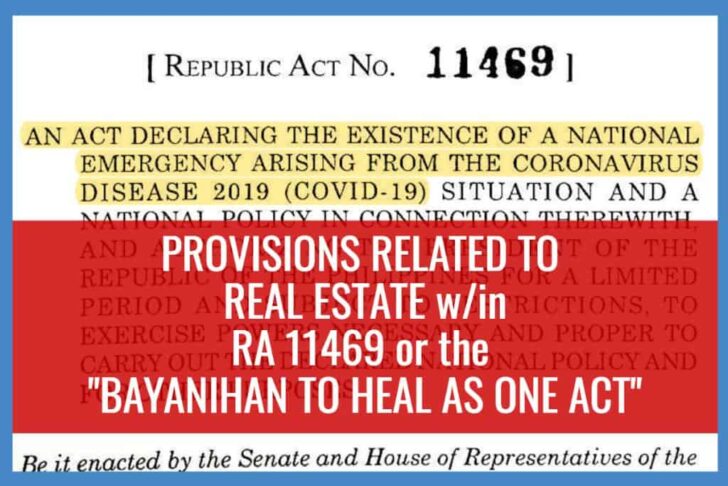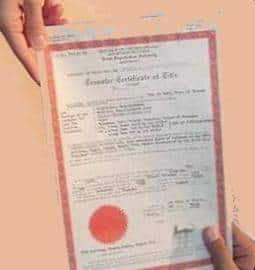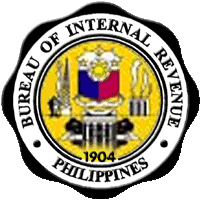Please see the full text of R.A. 9510 in relation to our post on The Importance of Credit History and Credit Scores in Real Estate Investing.
Republic of the Philippines
Congress of the Philippines
Metro Manila
Fourteenth Congress
Second Regular Session
Begun and held in Metro Manila, on Monday, the twenty-eight day of July, two thousand eight.
Republic Act No. 9510 October 31, 2008
AN ACT ESTABLISHING THE CREDIT INFORMATION SYSTEM AND FOR OTHER PURPOSES
Be it enacted by the Senate and House of Representatives of the Philippines in Congress assembled:
Section 1. Title. – This Act shall be known as the “Credit Information System Act”.
Section 2. Declaration of Policy. – The State recognizes the need to establish a comprehensive and centralized credit information system for the collection and dissemination of fair and accurate information relevant to, or arising from, credit and credit-related activities of all entities participating in the financial system. A credit information system will directly address the need for reliable credit information concerning the credit standing and track record of borrowers.
The operations and services of a credit information system can be expected to: greatly improve the overall availability of credit especially to micro, small and medium-scale enterprises; provide mechanisms to make credit more cost-effective; and reduce the excessive dependence on collateral to secure credit facilities.
The State shall endeavor to have credit information provided at the least cost to all participants and shall ensure the protection of consumer rights and the existence of fair competition in the industry at all times.
An efficient credit information system will also enable financial institutions to reduce their over-all credit risk, contributing to a healthier and more stable financial system.
Section 3. Definition of Terms. – For purposes of this Act:
(a) “Accessing Entity” refers to any submitting entity or any other entity authorized by the Corporation to access basic credit data from the Corporation.
(b) “Basic Credit Data” refers to positive and negative information provided by a borrower to a submitting entity in connection with the application for and availment of a credit facility and any information on the borrower’s creditworthiness in the possession of the submitting entity and other factual and objective information related or relevant thereto in the submitting entity’s data files or that of other sources of information: Provided, that in the absence of a written waiver duly accomplished by the borrower, basic credit data shall exclude confidential information on bank deposits and/or clients funds under Republic Act No. 1405 (Law on Secrecy of Bank Deposits), Republic Act No. 6426 (The Foreign Currency Deposit Act), Republic Act No. 8791 (The General Banking Law of 2000), Republic Act No. 9160 (Anti-Money Laundering Law) and their amendatory laws.
(c) “Borrower” refers to a natural or juridical person, including any local government unit (LGU), its subsidiaries and affiliates, that applies for and/or avails of a credit facility.
(d) “BSP” refers to the Bangko Sentral ng Pilipinas, created under Republic Act No.7653.
(e) “Corporation” refers to the Credit Information Corporation established under Section 5 of this Act.
(f) “Credit facility” refers to any loan, credit line, guarantee or any other form of financial accommodation from a submitting entity: Provided, That for purposes of this Act, deposits in banks shall not be considered a credit facility extended by the depositor in favor of the bank.
(g) “Credit Rating” refers to an opinion regarding the creditworthiness of a borrower or of an issuer of debt security, using an established and defined ranking system.
(h) “Credit Report” refers to a summary of consolidated and evaluated information on creditworthiness, credit standing, credit capacity, character and general reputation of a borrower.
(i) “Government Lending Institutions” refers to existing and future government (GFIs), government-owned and controlled corporations (GOCCs) primarilly engaged in lending activities.
(j) “Negative Credit Information” refers to information/data concerning the poor credit performance of borrowers such as, but not limited to, defaults on loans, adverse court judgments relating to debts and reports on bankruptcy, insolvency, petitions or orders on suspension of payments and corporate rehabilitation.
(k) “Non-Accessing Entity” refers to an entity other than a Submitting Entity, Special Accessing Entity or Borrower that is authorized by the Corporation to access credit information from a Special Accessing Entity.
(l) “Outsource entity” refers to any accredited third party provider to whom the Corporation may outsource the processing and consolidation of basic credit data pertaining to a borrower or issuer of debt or convertible securities under such qualifications, criteria and strict confidentiality guidelines that the Corporation shall prescribe and duly publish.
(m) “Positive credit information” refers to information/data concerning the credit performance of a borrower such as, but not limited to, information on timely repayments or non-delinquency.
(n) “Relevant Government Agencies” refers to the Department of Finance, Department of Trade and Industry, Bangko Sentral ng Pilipinas, Insurance Commission and the Cooperative Development Authority.
(o) “SEC” refers to the Securities and Exchange Commission.
(p) “Special Accessing Entity” refers to a duly accredited private corporation engaged primarily in the business of providing credit reports, ratings and other similar credit information products and services.
(q) “Submitting Entity” refers to any entity that provides credit facilities such as, but not limited to, banks, quasi-banks, trust entities, investment houses, financing companies, cooperatives, nongovernmental, micro-financing organizations, credit card companies, insurance companies and government lending institutions.
Section 4. Establishment of the Credit Information System. – In furtherance of the policy set forth in Section 2 of this Act, a credit information system is hereby established.
(a) Banks, quasi-banks, their subsidiaries and affiliates, life insurance companies, credit card companies and other entities that provide credit facilities are required to submit basic credit data and updates thereon on a regular basis to the Corporation.
(b) The Corporation may include other credit providers to be subject to compulsory participation: Provided, That all other entities qualified to be submitting entities may participate subject to their acceptance by the Corporation: Provided, further, That, in all cases, participation under the system shall be in accordance with such standards and rules that the SEC in coordination with the relevant government agencies my prescribe.
(c) Participating submitting entities are required to submit to the Corporation any negative and positive credit information that tends to update and/or correct the credit status of borrowers. The Corporation shall fix the time interval for such submission: Provided, That such interval shall not be less than fifteen (15) working days but not more than thirty (30) working days.
(d) The Corporation should regularly collect basic credit data of borrowers at least on a quarterly basis to correct/update the basic credit data of said borrowers.
(e) The Corporation may also access credit and other relevant information from government offices, judicial and administrative tribunals, prosecutorial agencies and other related offices, as well as pension plans administered by the government.
(f) Each submitting entity shall notify its borrowers of the former’s obligation to submit basic credit data to the Corporation and the disclosure thereof to the Corporation, subject to the provisions of this Act and the implementing rules and regulations.
(g) The Corporation is in turn authorized to release consolidated basic credit data on the borrower, subject to the provisions of Section 6 of this Act.
(h) The negative information on the borrower as contained in the credit history files of borrowers should stay in the database of the Corporation unless sooner corrected, for not more than three (3) years from and after the date when the negative credit information was rectified through payment or liquidation of the debt, or through settlement of debts through compromise agreements or court decisions that exculpate the borrower from liability. Negative information shall be corrected and updated within fifteen (15) days from the time of payment, liquidation or settlement of debts.
(i) Special Accessing Entities shall be accredited by the Corporation in accordance with such standards and rules as the SEC in coordination with the relevant government agencies, may prescribe.
(j) Special accessing entities shall be entitled access to the Corporation’s pool of consolidated basic credit data, subject to the provisions of Section s 6 and 7 of this Act and related implementing rules and regulations.
(k) Special accessing entities are prohibited from releasing basic credit data received from the Corporation or credit reports and credit ratings derived from the basic credit data received from the Corporation, to non-accessing entities unless the written consent or authorization has been obtained from the Borrower: Provided, however, That in case the borrower is a local government unit (LGU) or its subsidiary or affiliate, the special accessing entity may release credit information on the LGU, its subsidiary or affiliate upon written request and payment of reasonable fees by a constituent of the concerned LGU.
(l) Outsource Entities, which may process and consolidate basic credit data, are absolutely prohibited from releasing such data received from the Corporation other than to the Corporation itself.
(m) Accessing Entities shall hold strictly confidential any credit information they receive from the Corporation.
(n) The borrower has the right to know the causes of refusal of the application for credit facilities or services from a financial institution that uses basic credit data as basis or ground for such a refusal.
(o) The borrower, for a reasonable fee, shall have, as a matter of right, ready and immediate access to the credit information pertinent to the borrower. In case of erroneous, incomplete or misleading credit information, the subject borrower shall have the right to dispute the erroneous, incomplete, outdated or misleading credit information before the Corporation. The Corporation shall investigate and verify the disputed information within five (5) working days from receipt of the complaint. If its accuracy cannot be verified and cannot be proven, the disputed information shall be deleted. The borrower and the accessing entities and special accessing entities who have received such information shall be informed of the corresponding correction or removal within five (5) working days. The Corporation should use a simplified dispute resolution process to fast track the settlement/resolution of disputed credit information. Denial of these borrowers’ rights, without justifiable reason, shall entitle the borrower to indemnity.
Section 5. Establishment of the Central Credit Information Corporation. – There is hereby created a Corporation which shall be known as the Credit Information Corporation, whose primary purpose shall be to receive and consolidate basic credit data, to act as a central registry or central repository of credit information, and to provide access to reliable, standardized information on credit history and financial condition of borrowers.
(a) The Corporation is hereby authorized to adopt, alter, and use a corporate seal which shall be judicially noticed; to enter into contracts; to incur liabilities; to lease or own real or personal property, and to sell or otherwise dispose of the same; to sue and be sued; to compromise, condone or release any liability and otherwise to do and perform any and all things that may be necessary or proper to carry out the purposes of this Act.
(b) The authorized capital stock of the Corporation shall be Five hundred million pesos (P500,000,000.00) which shall be divided into common and preferred shares which shall be non-voting. The National Government shall own and hold sixty percent (60%) of the common shares while the balance of forty percent (40%) shall be owned by and held by qualified investors which shall be limited to industry associations of banks, quasi-banks and other credit related associations including associations of consumers. The amount of Seventy-five million pesos (PhP75,000,000.00) shall be appropriated in the General Appropriations Act for the subscription of common shares by the National Government to represent its sixty percent (60%) equity share and the amount of Fifty million pesos (PhP50,000,000.00) shall be subscribed and paid up by such qualified investors in accordance with Section 5(d) hereof.
(c) The National Government may subscribe or purchase securities or financial instrument that may be issued by the Corporation as a supplement to capital.
(d) Equal equity participation in the Corporation shall be offered and held by qualified private sector investors but in no case shall each of the qualified investor represented by an association of banks, quasi-banks and other credit-related associations including the associations of consumers have more than ten percent (10%) each of the total common shares issued by the Corporation.
(e) The SEC in coordination with relevant government agencies, shall prescribe additional requirements for the establishment of the Corporation, such as industry representation, capital structure, number of independent directors, and the process for nominating directors, and such other requirements to ensure consumer protection and free, fair and healthy competition in the industry.
(f) The Chairman of the SEC shall be the Chairman of the Board of Directors of the Corporation. Whenever the Chairman of the SEC is unable to attend a meeting of the Board, he/she shall designate an Associate Commissioner of the SEC to act as his/her alternate.
The powers and functions of the Corporation shall be exercised by a board of directors composed of fifteen (15) members. The directors representing the government shares shall be appointed by the President of the Philippines.
(g) The directors and principal officers of the Corporation, shall be qualified by the “fit and proper” rule for bank directors and officers. To maintain the quality of management of the Corporation and afford better protection to the system and the public in general, the SEC in coordination with the relevant government agencies, shall prescribe, pass upon and review the qualifications and disqualifications of individuals elected or appointed directors of the Corporation and disqualify those found unfit. After due notice to the board of directors of the Corporation, the SEC may disqualify, suspend or remove any director who commits or omits an act which render him unfit for the position. In determining whether an individual is fit and proper to hold the position of a director of the Corporation, due regard shall be given to his integrity, experience, education, training and competence.
The members of the Board of Directors must be Filipino citizens and at least thirty (30) years of age. In addition, they shall be persons of good moral character, of unquestionable integrity, of known probity, and have attained competence in the fields of law, finance, economics, computer science or information technology. In addition to the disqualifications imposed by the Corporation Code, as amended, no person shall be nominated by the national government if he has been connected directly with a banking or financial institution as a director or officer, or has substantial interest therein within three (3) years prior to his appointment.
(h) The Board of Directors may appoint such officers and employees as are not otherwise provided for in this Act, define their duties, fix their compensations and impose disciplinary sanctions upon such officers and employees, for cause. The salaries and other compensation of the officers and employees of the Corporation shall be exempt from the Salary Standardization Law. Appointments in the Corporation, except to those which are policy-determining, primarily confidential or highly technical in nature, shall be made only according to the Civil Service Law.
(i) The Corporation shall acquire and use state-of-the-art technology and facilities in its operations to ensure its continuing competence and capability to provide updated negative and positive credit information; to enable the Corporation to relay credit information electronically as well as in writing to those authorized to have access to the credit information system; and to insure accuracy of collected, stored and disseminated credit information. The Corporation shall implement a borrower’s identification system for the purpose of consolidating credit information.
(j) The provisions of any general or special law to the contrary notwithstanding, the importation by the Corporation of all equipment, hardware or software, as well as all other equipment needed for its operations shall be fully exempt from all customs duties and from all other taxes, assessments and charges related to such importation.
(k) The Corporation shall have its principal place of business in Metro Manila, but may maintain branches in such other places as the proper conduct of its business may require.
(l) Any and all acquisition of goods and services by the Corporation shall be subject to Procurement Laws.
(m) The national government shall continue to hold sixty percent (60%) of the common shares for a period not to exceed five (5) years from the date of commencement of operations of the Corporation. After the said period, the national government shall dispose of at least twenty percent (20%) of its stockholdings in the Corporation to qualified investors which shall be limited to industry associations of banks, quasi-banks and other credit-related associations, including associations of consumers. The national government shall offer equal equity participation in the Corporation to all qualified investors. When the ownership of the majority of the common voting shares of the Corporation passes to private investors, the stockholders shall cause the adoption and registration with the SEC of the amended articles of incorporation within three (3) months from such transfer of ownership.
Section 6. Confidentiality of Credit Information. – The Corporation, the submitting entities, the accessing entities, the outsource entities, the special accessing entities and the duly authorized non-accessing entities shall hold the credit information under strict confidentiality and shall use the same only for the declared purpose of establishing the creditworthiness of the borrower. Outsource entities which may process and consolidate basic credit data are absolutely prohibited from releasing such data received from the Corporation other than to the Corporation.
The accreditation of an accessing entity, a special entity and/or an outsource entity which violates the confidentiality of, or which misuses, the credit information accessed from the Corporation, may be suspended or revoked. Any entity which violates this section may be barred access to the credit information system and penalized pursuant to Section 11 of this Act.
The Corporation shall be authorized to release and disclose consolidated basic credit data only to the Accessing Entities, the Special Accessing Entities, the Outsource Entities and Borrowers. Basic Consolidated basic credit data released to Accessing Entities shall be limited to those pertaining to existing Borrowers or Borrowers with pending credit applications. Credit information shall not be released to entities other than those enumerated under this Section except upon order of the court.
Section 7. Educational Campaign. – A continuing nationwide educational campaign shall be developed and undertaken by the Corporation to promote the benefits of a credit information system to the economy; to create awareness on the rights of consumers/borrowers to access their credit reports collected, stored and disseminated by the Corporation; to disseminate the rights of the borrowers to dispute any incorrect/inaccurate credit information in the database file of the Corporation; to familiarize consumers of the procedure in collecting, storing and disseminating credit information of borrowers by the Corporation; and to brief consumers of other related information.
Section 8. Rules and Regulations. – For purposes of creating a healthy balance between the need for reliable credit information and safeguarding consumer protection, ensuring free and healthy competition in the industry, the SEC, in coordination with relevant government agencies and existing industry stakeholders, shall issue the implementing rules and regulations (IRRs), which shall be reviewed, revised and approved by the Oversight Committee to ensure consistency and compliance with the provisions of this Act, embodying among others:
(a) The basic credit data shall be limited or confined in form and content to an objective and factual information and shall exclude any subjective information or opinion;
(b) Restrictions on the use and transfer of credit information;
(c) Rights of the borrowers to access their respective credit information and to dispute the factual accuracy of such credit information;
(d) Requirements and standards for the establishment of the Corporation including, but not limited to, ownership, industry representation, independent directors and process of nomination of directors;
(e) Accreditation standards for submitting entities and special accessing entities and non-accessing entities;
(f) Sanctions to be imposed by the Corporation on:
(i) The submitting entities for non-submission of reports and for delayed and/or erroneous reporting;
(ii) Accessing entities, special accessing entities, outsource entities and duly authorized non-accessing entities, for breaches of the confidentiality of misuse of, the credit information obtained from the credit information system; and
(iii) Violations of other applicable rules and regulations: Provided, That these administrative sanctions shall be in the form of fines in amounts as may be determined by the Corporation but in no case to exceed Thirty thousand pesos (PhP30,000.00) a day for each violation, taking into consideration the attendant circumstances, such as the nature and gravity of the violation or irregularity. Imposition of administrative sanctions shall be without prejudice to any criminal and other sanctions as may be applicable under this Act and relevant laws;
(g) Suspension or cancellation of the rights of any Accessing Entity or Special Accessing Entity to access Credit Information from the Corporation; Provided, That the SEC in coordination with relevant government agencies and existing industry stakeholders, may issue subsequent regulations consistent with the IRR as approved by the Congressional Oversight Committee.
In addition, the SEC may regulate access to the credit information system as well as the fees that shall be collected by the Corporation from the Accessing and Special Accessing Entities, taking into consideration the policy of lowering the cost of credit, promoting fair competition, and the need of the Corporation to employ state-of-the-art technology; and
(h) The basic credit data about a borrower shall be limited to credit information existing on the date of the enactment of this Act and thereafter.
Section 9. Congressional Oversight Committee. – There is hereby created a congressional oversight committee, composed of seven (7) members from the Senate and seven (7) members from the House of Representatives. The Members from the Senate shall be appointed by the Senate President with at least three (3) Senators representing the minority. The Members of the House of Representatives shall be appointed by the Speaker with at least three (3) members representing the minority.
After the Oversight Committee approved the implementing rules and regulations, it shall thereafter become functus officio, and therefore cease to exist: Provided, That the Congress may revive the Congressional Oversight Committee in case of a need for any major revision/s in the implementing rules and regulations.
Section 10. Indemnity in Favor of the Corporation, its Officers and Employees. – Unless the Corporation or any of its officers and employees is found liable for any willful violation of this Act, bad faith, malice and/or gross negligence, the Submitting Entities, Accessing Entities, Special Accessing Entities, Outsource Entities and duly authorized non-accessing entities shall hold the Corporation, its directors, officers and employees free and harmless to the fullest extent permitted by law and shall indemnify them from any and all liabilities, losses, claims, demands, damages, deficiencies, costs and expenses of whatsoever kind and nature that may arise in connection with the performance of their functions without prejudice to any criminal liability under existing laws.
Section 11. Penalties. – Any person who willfully violates any of the provisions of this Act or the rules and regulations promulgated by the SEC in coordination with the relevant government agencies shall, upon conviction, suffer a fine of not less than Fifty thousand pesos (PhP50,000.00). nor more than One million pesos (PhP1,000,000.00) or imprisonment of not less than one (1) year nor more than five (5) years, or both, at the discretion of the court.
Section 12. Inviolable Nature of the Secrecy of Bank Deposits and/or Client Funds. -Pursuant to Republic Act No. 1405 (Law on Secrecy of Bank Deposits), Republic Act No. 6426 (The Foreign Currency Deposit Act), Republic Act No. 8791 (The General Banking Law of 2000), Republic Act No. 9160 (Anti-Money Laundering Law) and their amendatory laws, nothing in this Act shall impair the secrecy of bank deposits and and/or client funds and investments in government securities or funds.
Section 13. Annual Report. – The SEC shall submit an annual report to Congress on the status of the implementation of this Act.
Sec. 14. Principal Government Agency. – The SEC shall be the lead government agency to implement and enforce this Act. As lead agency, the SEC shall consult and coordinate with other relevant government agencies in the adoption of all rules and regulations for the full and effective implementation and enforcement of this Act, taking into account the policy objectives contained in Section 2 hereof.
Section 15. Separability Clause. – Should any provision of this Act or the application thereof to any person or circumstance be held invalid, the other provisions or sections of this Act shall not be affected thereby.
Section 16. Repealing Clause. – This Act repeals Presidential Decree No. 1941 in its entirety. All laws, decrees, executive orders, rules and regulations or parts thereof which are inconsistent with this Act are hereby repealed, amended or modified accordingly.
Section 17. Effectivity Clause. – This Act shall take effect fifteen (15) days following its publication in the Official Gazette or in at least two (2) newspapers of general circulation.
Approved
| (Sgd.) PROSPERO C. NOGRALES Speaker of the House of Representative |
(Sgd.) MANNY VILLAR President of the Se nate |
This Act which is a consolidation of Senate Bill No. 1881 and House Bill No. 4260 was finally passed by the Senate and the House of Representative on September 1, 2008.
| (Sgd.) MARILYN B. BARUA-YAP Secretary General House of Representative |
(Sgd.) EMMA LIRIO-REYES Secretary of the Senate |
Approved: OCT 31, 2008
(Sgd.) GLORIA MACAPAGAL-ARROYO
President of the Philippines








